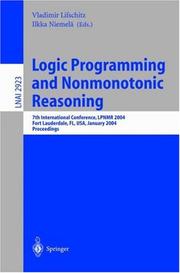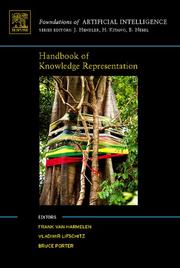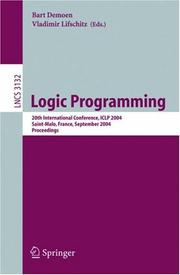| Listing 1 - 9 of 9 |
Sort by
|
Book
ISBN: 0124500102 1299193757 032314831X 9780124500105 Year: 1991 Publisher: Boston London Sydney Academic Press
Abstract | Keywords | Export | Availability | Bookmark
 Loading...
Loading...Choose an application
- Reference Manager
- EndNote
- RefWorks (Direct export to RefWorks)
AI(Artificial intelligence) --- Artificial intelligence --- Artificial thinking --- Artificiële intelligentie --- Calculs numériques --- Computerprogrammering --- Computers --- Electronic brains --- Intellectronics --- Intelligence [Artificial ] --- Intelligence artificielle --- Intelligent machines --- Kunstmatige intelligentie --- Machine intelligence --- Numerical calculations --- Numerieke berekeningen --- Ordinateurs --- Programmation des ordinateurs --- Programming (Electronic computers) --- Thinking [Artificial ] --- Computer programming --- McCarthy, John, --- Cerveaux électroniques --- Machines intelligentes --- Pensée artificielle --- Artificial intelligence. --- Numerical calculations. --- Computers. --- McCarthy, John, 1927 --- -Artificial intelligence --- McCarthy, John, - 1927 --- McCarthy, John, 1927-
Book
ISBN: 3030246582 3030246574 Year: 2019 Publisher: Cham : Springer International Publishing : Imprint: Springer,
Abstract | Keywords | Export | Availability | Bookmark
 Loading...
Loading...Choose an application
- Reference Manager
- EndNote
- RefWorks (Direct export to RefWorks)
Answer set programming (ASP) is a programming methodology oriented towards combinatorial search problems. In such a problem, the goal is to find a solution among a large but finite number of possibilities. The idea of ASP came from research on artificial intelligence and computational logic. ASP is a form of declarative programming: an ASP program describes what is counted as a solution to the problem, but does not specify an algorithm for solving it. Search is performed by sophisticated software systems called answer set solvers. Combinatorial search problems often arise in science and technology, and ASP has found applications in diverse areas—in historical linguistic, in bioinformatics, in robotics, in space exploration, in oil and gas industry, and many others. The importance of this programming method was recognized by the Association for the Advancement of Artificial Intelligence in 2016, when AI Magazine published a special issue on answer set programming. The book introduces the reader to the theory and practice of ASP. It describes the input language of the answer set solver CLINGO, which was designed at the University of Potsdam in Germany and is used today by ASP programmers in many countries. It includes numerous examples of ASP programs and present the mathematical theory that ASP is based on. There are many exercises with complete solutions.
Computer science. --- Logic design. --- Artificial intelligence. --- Programming Languages, Compilers, Interpreters. --- Logics and Meanings of Programs. --- Artificial Intelligence. --- AI (Artificial intelligence) --- Artificial thinking --- Electronic brains --- Intellectronics --- Intelligence, Artificial --- Intelligent machines --- Machine intelligence --- Thinking, Artificial --- Bionics --- Cognitive science --- Digital computer simulation --- Electronic data processing --- Logic machines --- Machine theory --- Self-organizing systems --- Simulation methods --- Fifth generation computers --- Neural computers --- Design, Logic --- Design of logic systems --- Digital electronics --- Electronic circuit design --- Logic circuits --- Switching theory --- Informatics --- Science --- Programming languages (Electronic computers). --- Computer logic. --- Computer science logic --- Logic, Symbolic and mathematical --- Computer languages --- Computer program languages --- Computer programming languages --- Machine language --- Languages, Artificial

ISBN: 354020721X 9786610307975 3540246096 9783540207214 Year: 2004 Volume: 2923 Publisher: Berlin Springer
Abstract | Keywords | Export | Availability | Bookmark
 Loading...
Loading...Choose an application
- Reference Manager
- EndNote
- RefWorks (Direct export to RefWorks)
681.3*D16 --- 681.3*F41 --- 681.3*I2 --- 681.3*I23 --- 681.3*I23 Deduction and theorem proving: answer/reason extraction reasoning resolution metatheory mathematical induction logic programming (Artificial intelligence) --- Deduction and theorem proving: answer/reason extraction reasoning resolution metatheory mathematical induction logic programming (Artificial intelligence) --- 681.3*I2 Artificial intelligence. AI --- Artificial intelligence. AI --- 681.3*F41 Mathematical logic: computability theory computational logic lambda calculus logic programming mechanical theorem proving model theory proof theoryrecursive function theory--See also {681.3*F11} {681.3*I22} {681.3*I23} --- Mathematical logic: computability theory computational logic lambda calculus logic programming mechanical theorem proving model theory proof theoryrecursive function theory--See also {681.3*F11} {681.3*I22} {681.3*I23} --- Computerwetenschap--?*D16 --- Logic programming --- Nonmonotonic reasoning --- Non-monotonic reasoning --- Computer science. --- Software engineering. --- Computer programming. --- Mathematical logic. --- Artificial intelligence. --- Computer Science. --- Software Engineering/Programming and Operating Systems. --- Artificial Intelligence (incl. Robotics). --- Programming Techniques. --- Mathematical Logic and Formal Languages. --- AI (Artificial intelligence) --- Artificial thinking --- Electronic brains --- Intellectronics --- Intelligence, Artificial --- Intelligent machines --- Machine intelligence --- Thinking, Artificial --- Bionics --- Cognitive science --- Digital computer simulation --- Electronic data processing --- Logic machines --- Machine theory --- Self-organizing systems --- Simulation methods --- Fifth generation computers --- Neural computers --- Algebra of logic --- Logic, Universal --- Mathematical logic --- Symbolic and mathematical logic --- Symbolic logic --- Mathematics --- Algebra, Abstract --- Metamathematics --- Set theory --- Syllogism --- Computers --- Electronic computer programming --- Electronic digital computers --- Programming (Electronic computers) --- Coding theory --- Computer software engineering --- Engineering --- Informatics --- Science --- Programming --- 681.3*I23 Deduction and theorem proving: answer/reason extraction; reasoning; resolution; metatheory; mathematical induction; logic programming (Artificial intelligence) --- Deduction and theorem proving: answer/reason extraction; reasoning; resolution; metatheory; mathematical induction; logic programming (Artificial intelligence) --- 681.3*F41 Mathematical logic: computability theory; computational logic; lambda calculus; logic programming; mechanical theorem proving; model theory; proof theory;recursive function theory--See also {681.3*F11}; {681.3*I22}; {681.3*I23} --- Mathematical logic: computability theory; computational logic; lambda calculus; logic programming; mechanical theorem proving; model theory; proof theory;recursive function theory--See also {681.3*F11}; {681.3*I22}; {681.3*I23} --- Reasoning --- Artificial Intelligence. --- Logic programming - Congresses --- Nonmonotonic reasoning - Congresses
Book
Year: 1989 Publisher: [Etats-Unis] : [International joint conferences on artificial],
Abstract | Keywords | Export | Availability | Bookmark
 Loading...
Loading...Choose an application
- Reference Manager
- EndNote
- RefWorks (Direct export to RefWorks)
Book
Year: 1990 Publisher: Norwood : Ablex publishing corporation,
Abstract | Keywords | Export | Availability | Bookmark
 Loading...
Loading...Choose an application
- Reference Manager
- EndNote
- RefWorks (Direct export to RefWorks)
Book
ISBN: 9783030246587 Year: 2019 Publisher: Cham Springer International Publishing :Imprint: Springer
Abstract | Keywords | Export | Availability | Bookmark
 Loading...
Loading...Choose an application
- Reference Manager
- EndNote
- RefWorks (Direct export to RefWorks)

ISBN: 9780444522115 0444522115 9780080557021 0080557023 Year: 2008 Publisher: Boston Elsevier
Abstract | Keywords | Export | Availability | Bookmark
 Loading...
Loading...Choose an application
- Reference Manager
- EndNote
- RefWorks (Direct export to RefWorks)
Knowledge Representation, which lies at the core of Artificial Intelligence, is concerned with encoding knowledge on computers to enable systems to reason automatically. The Handbook of Knowledge Representation is an up-to-date review of twenty-five key topics in knowledge representation, written by the leaders of each field. This book is an essential resource for students, researchers and practitioners in all areas of Artificial Intelligence. * Make your computer smarter * Handle qualitative and uncertain information * Improve computational tractability to solve your problems easily.

ISSN: 03029743 ISBN: 3540226710 9783540277757 3540277757 9783540226710 Year: 2004 Volume: 3132 Publisher: Berlin, Heidelberg : Springer Berlin Heidelberg : Imprint: Springer,
Abstract | Keywords | Export | Availability | Bookmark
 Loading...
Loading...Choose an application
- Reference Manager
- EndNote
- RefWorks (Direct export to RefWorks)
This volume contains the papers presented at the 20th International Conference on Logic Programming,held in Saint-Malo,France,September 6–10,2004.Since the ?rst meeting in this series, held in Marseilles in 1982, ICLP has been the premier international conference for presenting research in logic programming. This year, we received 70 technical papers from countries all over the world, and the Program Committee accepted 28 of them for presentation;they are included in this volume. A stand-by-your-poster session took place during the conference. It served as a forum for presenting work in a more informal and interactive setting. Abstracts of the 16 posters selected by the Program Committee are included in this volume as well. The conference program also included invited talks and invited tutorials. We were privileged to have talks by three outstanding researchers and excellent speakers: Nachum Dershowitz (Tel Aviv University, Israel) talked on Ter- nation by Abstraction, Michael Gelfond (Texas Tech University, USA) on - swer Set Programming and the Design of Deliberative Agents,andG´ erard Huet (INRIA, France) on Non-determinism Lessons. Two of the invited talks appear in these proceedings. The tutorials covered topics of high interest to the logic programming community: Ilkka Niemel¨ a gave a tutorial on The Implementation of Answer Set Solvers, Andreas Podelskion Tree Automata in Program Analysis and Veri?cation, and Guillermo R. Simari on Defeasible Logic Programming and Belief Revision. Satellite workshops made the conference even more interesting. Six workshops collocated with ICLP 2004: – CICLOPS2004, Colloquium on Implementation of Constraint and Logic Programming Systems, organized by Manuel Carro. – COLOPS2004, 2nd International Workshop on Constraint & Logic Progr- ming in Security, organized by Frank Valencia. – MultiCPL2004, 3rd International Workshop on Multiparadigm Constraint, organized by Petra Hofstedt. – Teach LP2004,1st International Workshop on Teaching Logic Programming, organized by Dietmar Seipel.
Academic collection --- 681.3*D16 --- 681.3*I23 --- 681.3*D3 --- 681.3*D3 Programming languages --- Programming languages --- 681.3*I23 Deduction and theorem proving: answer/reason extraction reasoning resolution metatheory mathematical induction logic programming (Artificial intelligence) --- Deduction and theorem proving: answer/reason extraction reasoning resolution metatheory mathematical induction logic programming (Artificial intelligence) --- Computerwetenschap--?*D16 --- Logic programming --- Computer science. --- Software engineering. --- Computer programming. --- Programming languages (Electronic computers). --- Computer logic. --- Mathematical logic. --- Artificial intelligence. --- Computer Science. --- Software Engineering/Programming and Operating Systems. --- Programming Techniques. --- Artificial Intelligence (incl. Robotics). --- Programming Languages, Compilers, Interpreters. --- Logics and Meanings of Programs. --- Mathematical Logic and Formal Languages. --- 681.3*I23 Deduction and theorem proving: answer/reason extraction; reasoning; resolution; metatheory; mathematical induction; logic programming (Artificial intelligence) --- Deduction and theorem proving: answer/reason extraction; reasoning; resolution; metatheory; mathematical induction; logic programming (Artificial intelligence) --- AI (Artificial intelligence) --- Artificial thinking --- Electronic brains --- Intellectronics --- Intelligence, Artificial --- Intelligent machines --- Machine intelligence --- Thinking, Artificial --- Bionics --- Cognitive science --- Digital computer simulation --- Electronic data processing --- Logic machines --- Machine theory --- Self-organizing systems --- Simulation methods --- Fifth generation computers --- Neural computers --- Algebra of logic --- Logic, Universal --- Mathematical logic --- Symbolic and mathematical logic --- Symbolic logic --- Mathematics --- Algebra, Abstract --- Metamathematics --- Set theory --- Syllogism --- Computer science logic --- Logic, Symbolic and mathematical --- Computer languages --- Computer program languages --- Computer programming languages --- Machine language --- Languages, Artificial --- Computers --- Electronic computer programming --- Electronic digital computers --- Programming (Electronic computers) --- Coding theory --- Computer software engineering --- Engineering --- Informatics --- Science --- Programming --- Logic design. --- Artificial Intelligence. --- Design, Logic --- Design of logic systems --- Digital electronics --- Electronic circuit design --- Logic circuits --- Switching theory --- Logic programming - Congresses.

ISBN: 9780444522115 0444522115 9780080557021 0080557023 1281144940 9786611144944 Year: 2008 Publisher: Amsterdam : Elsevier,
Abstract | Keywords | Export | Availability | Bookmark
 Loading...
Loading...Choose an application
- Reference Manager
- EndNote
- RefWorks (Direct export to RefWorks)
Knowledge Representation, which lies at the core of Artificial Intelligence, is concerned with encoding knowledge on computers to enable systems to reason automatically. The Handbook of Knowledge Representation is an up-to-date review of twenty-five key topics in knowledge representation, written by the leaders of each field.This book is an essential resource for students, researchers and practitioners in all areas of Artificial Intelligence.* Make your computer smarter* Handle qualitative and uncertain information* Improve computational tractability to solve yo
| Listing 1 - 9 of 9 |
Sort by
|

 Search
Search Feedback
Feedback About
About Help
Help News
News